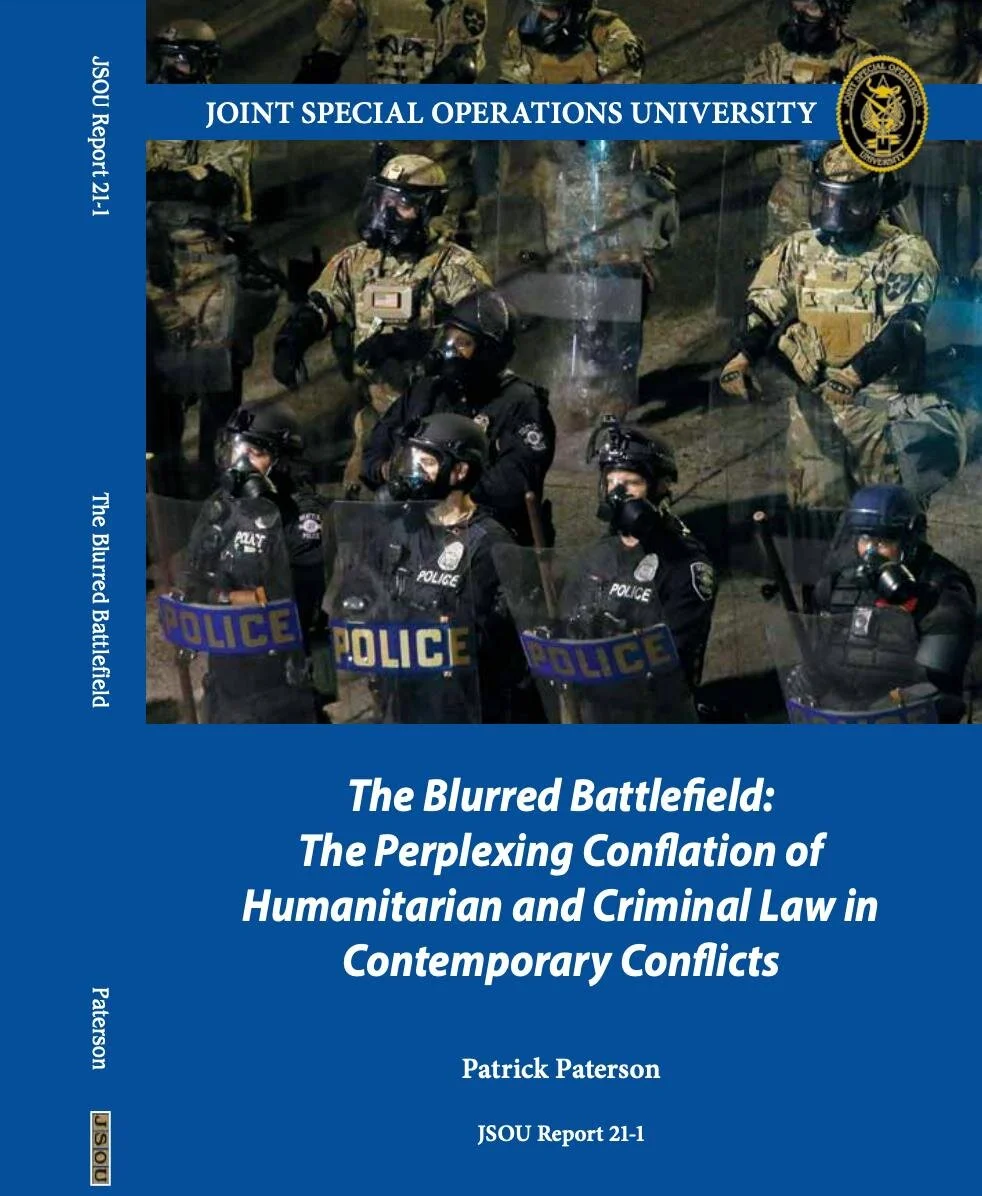I am pleased to announce the publication of my most recent book, The Blurred Battlefield: The Perplexing Conflation of Humanitarian and Criminal Law in Contemporary Conflicts.
Written with a grant from Joint Special Operations University (JSOU), the book examines the legal grey areas of the use of force in modern warfare. Conventional conflicts between nations are normally governed by the Geneva Conventions and other treaties on the law of armed conflict (LOAC). However, in today’s security environment, there are few state-on-state conflicts. Instead, most violent disputes fall into the category of internal disturbances caused by criminal factions such as cartels, gangs, and terrorist factions. These disputes – called “other situations of violence” by the International Committee of the Red Cross (ICRC) – are governed by criminal and human rights law. Most professional military forces are well indoctrinated on LOAC rules but have little experience with criminal and human rights that are used by police forces. Hence, today’s militaries require a hybrid doctrine that includes both LOAC and criminal law.
My new book addresses three important issues: (1) the nature of contemporary warfare, (2) SOF participation in security cooperation efforts, and (3) rules on the use of force. I provide brief histories of LOAC, criminal law, and HR law, highlight the differences between the fields of law, and examine U.S. use of force policies. Readers will learn lessons on the distinctions between LOAC and criminal law, particularly on important issues like lethal force, escalation of force tactics, and detention.
I look at the issues through two separate lenses: first, from the perspective of U.S. Special Operations Forces (SOF) and second, through a detailed examination of how four Latin American countries have tried to manage the complex legal pitfalls of modern conflict. As part of the U.S. government’s security cooperation enterprise, U.S. SOF provide military assistance to the armed forces of the U.S. partner nations. Each year, Army SOF and Navy Seals visit dozens of nations and train tens of thousands of foreign forces in a variety of military tactics. However, training partner nation (PN) forces in LOAC is inherently risky if the foreign forces are tasked with law enforcement missions – something that occurs in nearly every Latin American and African country examined for this study. LOAC rules are much more permissive with regard to the use of force while police rules on the use of force are very restrictive. Teaching tactics that are inappropriate for the circumstances may have disastrous consequences. In a sense, U.S. forces need to figure out how to operationalize human rights law for soldiers conducting law enforcement operations.
The four case studies in the book are drawn from Latin America. From the perspective of security, the region is a study in contrasts. The region’s militaries are trained in the LOAC but have little use for it. There has not been a state-on-state conflict in the Western Hemisphere since the Cenepa War—a brief one-month border skirmish between Peru and Ecuador in 1995. That is not to say the region would be described as safe or peaceful. In fact, violent groups such as cartels, gangs, and insurgents have made Latin America the most dangerous region in the world. Consequently, nearly every nation in the region has deployed its militaries to support or supplant the police. The Blurred Battlefield examines how the military forces in Brazil, Chile, Colombia, and Mexico have attempted to navigate the very complex operating environment as they battle heavily armed, violent criminals.
I am grateful to the Joint Special Operations University which provided a substantial research grant to write the book. Research for the book included 75-80 interviews and site visits to SOF military units throughout the U.S. as well as to locations in Brazil, Chile, Colombia, and Mexico. Sincere thanks to Juan Mendez, former United Nations Special Rapporteur, who wrote the foreword, and to a number of second readers who provided important advice on the detailed legal issues I address.


